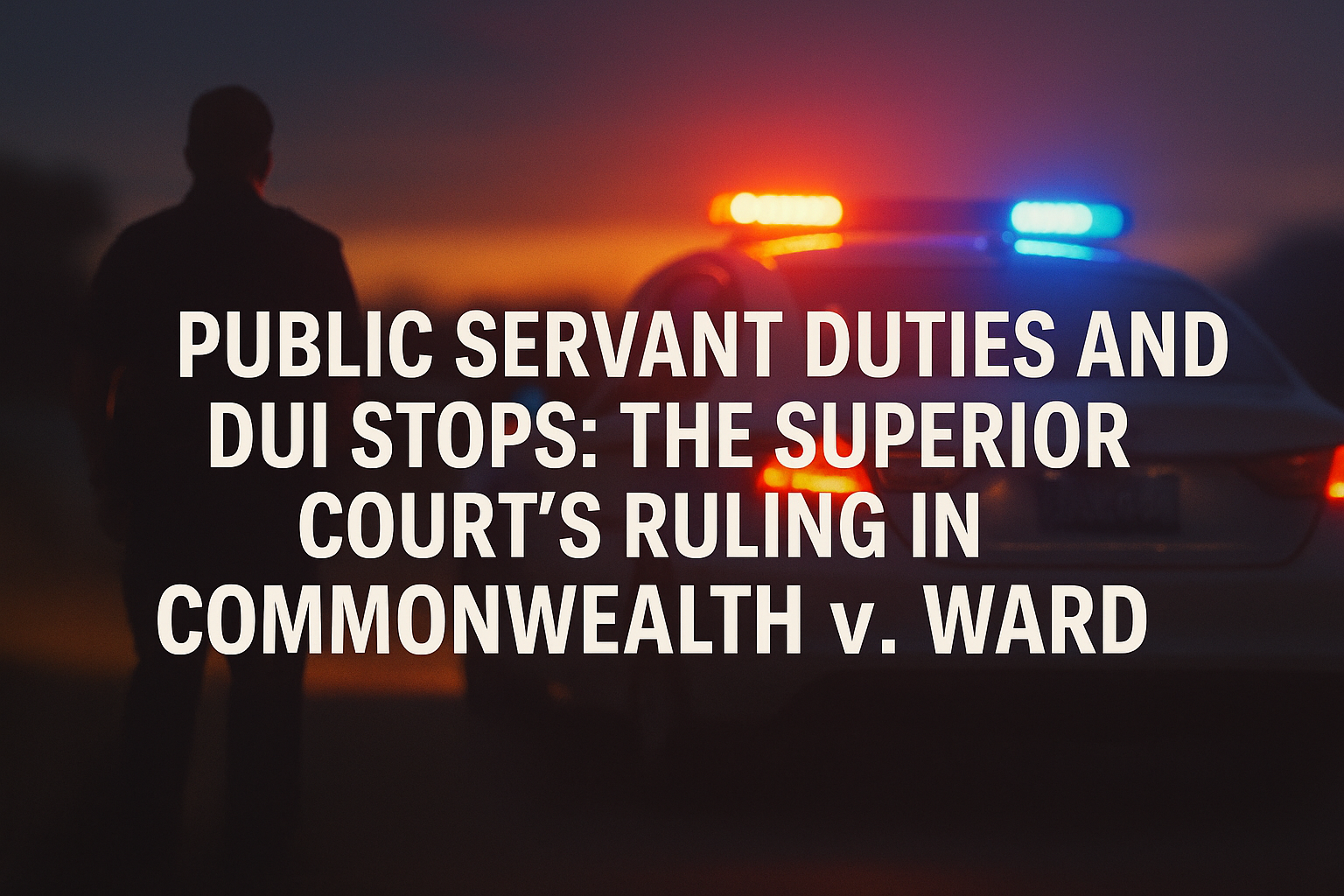Public Servant Duties and DUI Stops: The Superior Court’s Ruling in Commonwealth v. Ward
June 9, 2025
 Commonwealth v. Ward, 318 A.3d 410 (Pa.Super. 2024)
Commonwealth v. Ward, 318 A.3d 410 (Pa.Super. 2024)
Background & Case Overview
In late May 2023, Joshua W. Ward was pulled over on a Chester County on‑ramp by Pennsylvania State Troopers Colton Demberger and Justin Pfeifer. His stopped, running vehicle had its driver's door ajar, and Ward appeared unwell—leaning over the open door, sweating, and vomiting. Trooper Demberger, concerned, activated his cruiser lights and approached to perform a welfare check.
During that interaction, Ward admitted he was ill. Trooper Pfeifer spotted a pill bottle in the passenger door. Shortly after, Trooper Demberger detected the odor of marijuana, prompting a transition from welfare check to DUI investigation. Ward was arrested and charged with multiple DUI counts and drug‑related offenses. He moved to suppress the evidence, claiming the encounter was a warrantless, unconstitutional stop. The trial court upheld the stop under the community‑caretaking doctrine, and Ward’s DUI convictions were affirmed by the jury. Ward then appealed.
Superior Court Decision
Pennsylvania's Superior Court affirmed the denial of Ward’s suppression motion, conducting a detailed Fourth Amendment analysis. While acknowledging that the encounter constituted a “seizure,” the Court found justification under the public‑servant exception, which allows warrantless stops when troopers perform community‑oriented duties—not traffic enforcement.
✅ 1. Objective Signs of Need for Aid
Trooper Demberger observed:
A running vehicle parked on a shoulder at night
Ward inside, visibly ill and vomiting
The driver leaning out the open door in sweating distress
The trooper’s actions—illuminating the vehicle, approaching on-foot, and asking, “Is everything okay?”—were clearly motivated by a concern for Ward’s welfare, rather than probing for criminal activity.
✅ 2. Detachment from Criminal Investigation
Before any drug-related evidence emerged, the troopers’ actions remained consistent with a genuine welfare check. There was no indication that they were looking for criminal behavior; rather, they were responding to immediately observable distress.
✅ 3. Proportional, Tailored Response
The troopers employed the least intrusive method aligned with their perceived duty: pulling over, turning on lights, and personally checking on Ward. Their actions closely mirrored their public‑safety role—like firefighters responding to a potential roadside health emergency—rather than law enforcement seeking probable cause initially.
Only after smelling marijuana and identifying paraphernalia did the troopers shift focus to DUI investigation—occurring after the welfare concern justified contact.
Significance and Takeaways
Public-Servant Exception Validated: The Court reaffirmed that welfare-based stops are constitutionally permissible—even without reasonable suspicion of criminal activity—when troopers act out of genuine aid motives.
Structured, Phased Interaction: Once legitimate welfare concerns are verified or disproven, a shift to criminal investigation must follow constitutional standards (reasonable suspicion/probable cause).
Safe Roads vs. Criminal Probing: The opinion clearly draws the line between public-safety duties and criminal enforcement, emphasizing that the former can pacify Fourth Amendment worries when executed properly.
Bottom Line
Commonwealth v. Ward underscores Pennsylvania’s recognition that troopers often act in a dual role—both protectors and enforcers. As long as welfare concerns are real, objectively reasonable, and lead to minimal interference, troopers may approach a stranded vehicle without needing a warrant or suspicion. The Supreme Court's logic, mirrored here, affirms that public‑safety duties can sometimes override normal Fourth Amendment protections—so long as the line between caring for citizens and investigating crimes remains clear.

